Denise Farms: Family Provides Farm-to-Table Vegetables to Dallas Neighborhoods
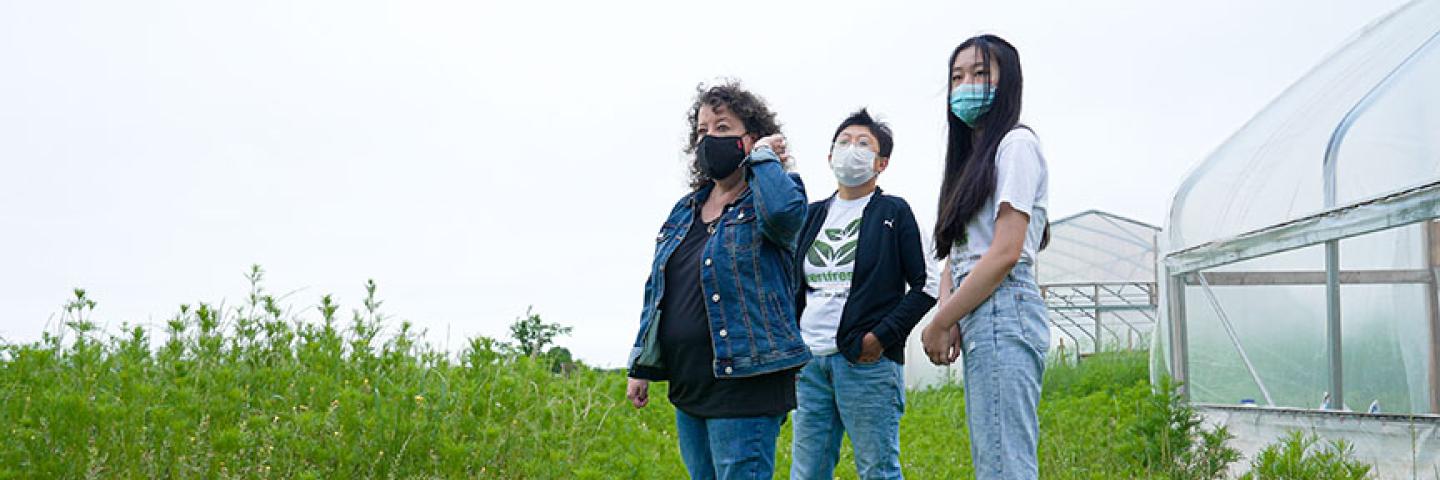
As is the case on most days, Denise Farms is a busy place to be. Owners Ken and Susie are on-hand making sure things are running smoothly, considering the operation’s unique moving parts, which include something pretty different for the Dallas area—a state-of-the-art hydroponic greenhouse.
ArcGIS storymap, story and photos compiled by Dee Ann Littlefield, NRCS Public Affairs Specialist, Henrietta
Denise Farms - Fresh & Delicious ArcGIS StoryMap
As is the case on most days, Denise Farms is a busy place to be. Owners Ken and Susie are on-hand making sure things are running smoothly, considering the operation’s unique moving parts, which include something pretty different for the Dallas area—a state-of-the-art hydroponic greenhouse.
The 10,000 square-foot hydroponic garden, coupled with a reverse osmosis system, has been the driving force for the family farm, to be able to grow higher quality vegetables using far less space, while conserving water and producing higher yields.
“Like humans, plants need purified water and the best water so they can be healthy, too,” Susie says, hinting at the crux of what makes the vegetables grown in their hydroponic garden stand out from the crowd.
The 12-acre farm is also home to two 1,400 square-foot seasonal high-tunnels, one of which is geared toward Asian-specific crops, as well as some outdoor
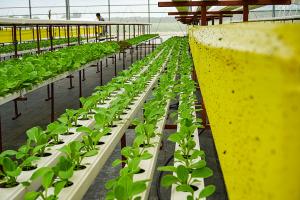
planting space for heartier plants like asparagus and garlic. They are also starting an orchard where they have newly planted jujube trees, which they eventually plan to market. Straight out of a storybook, visitors happening upon the family farm will also find chickens, geese, and ducks roaming around the property, as well as the adorable, but attentive, guard dog, Douglas.
A typical working farm from a distance, once you take a closer look at the inner workings, it’s very clear the couple has taken things to a new level in their quest to produce the fresh produce they felt was missing from the local scene when they arrived in the Dallas area about six years ago.
And it’s obvious, as Susie and her daughter, Karen, walk around the property pointing out various plants and vegetables—some familiar and some more exotic—they are just getting started.
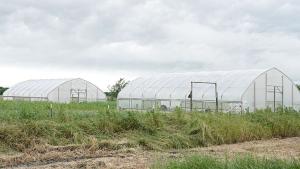
A Family Farm Built on a Dream and Fueled by Innovation
Ken and Susie moved their family of four from Los Angeles to Dallas in 2012, purchasing Denise Farms in 2018 with the goal of creating a “vegetable factory” of sorts, capable of producing garden-fresh organic vegetables just like the ones they’d enjoyed in LA’s farm-to-table scene.
They’d discovered the vegetables sold in the local Dallas supermarkets were not fresh after several days of transportation and storage. They also noted the lack of available Asian produce. The high temperatures in the summer didn’t help either. The unpleasant deterioration is a common occurrence, especially for Asian leafy greens, which tend to have a shorter shelf-life span, losing both nutrients and flavor.
“We grow a lot of leafy vegetables like lettuce, spinach, and vegetables that are popular with the Asian community, as well as other things like tomatoes and chili peppers,” says Karen, of the family’s response to fill a need not only for the Asian community, but the Dallas area as a whole.
Determined to offer crisp, homegrown produce, the ambitious couple first had to deal with the reality of farming in a less than ideal climate with inadequate soil conditions. They set out to overcome these obstacles.
And so, with a background that includes garlic farming and farming techniques found to work well in China, Ken and Susie set out to make their Asian vegetable farm-to-table dream come true.
Their Dallas-based farming journey began with educational tours of farms across the United States to see what others were doing. They also attended agricultural conferences and trainings and connected with Texas agriculture specialists, including the USDA Natural Resources Conservation Service (NRCS), as well as fellow suppliers both within the region and nationwide.
With their NRCS partnership in place to help fund projects like their first two seasonal high-tunnels, Denise Farms became operational in February 2020, after two years of intense planning, investing, and constructing, thanks to their unwavering dedication.
Monica Purviance, NRCS District Conservationist in Greenville, has been with the NRCS for 32 years and has worked closely with Ken and Susie for the past three years.
“Ken and Susie are great people to work with. They’ve put a lot of time and effort in getting the farm up and going,” she says.
Ken is primarily responsible for planning out, building, and maintaining the structures on the farm, while Susie oversees operations management, finances, and customer relations. Their daughter, Karen, provides a hand with basic planting, as well as providing graphic design and social media support to promote the farm.
According to Karen, her younger brother enjoys coming out on the weekends to play with the farm animals. He also pitches in by putting seeds into coconut fiber sponges and transporting them into the farm’s greenhouse. “It’s very easy and fun for kids to do,” she says.
Along Came COVID-19
As luck would have it, just as the budding organic farm’s first batch of produce came to harvest as delicious, fresh ingredients, ready and waiting to be listed on the menus of area restaurants, the 2020 COVID-19 Pandemic reared its ugly head. As a result of nationwide closures, Ken and Susie’s vegetables never made it into eateries as scheduled.
Like so many other farmers, Ken and Susie quickly pivoted in response to pandemic restrictions, as well as to an unforeseen demand from individual community members who were suddenly more open to buying directly from local farms. The family attributes this to the fact that some folks didn’t want to take chances going into stores, while others were looking for vegetables unavailable due to the short supply through regular channels. Still others found themselves at home for the first time in a while, and with more time to cook, eager to try out new ingredients and new recipes.
“When COVID first hit, a lot of people were afraid to go to the supermarkets, so we thought it’d be a good idea to use an online platform,” says Karen, who explains her parents established four pickup spots in and around the Dallas-Fort Worth area.
“Now, every week, people can place orders online and then my parents deliver orders to the pickup spots.”
Even with restrictions somewhat relaxed, they continue to conduct a lot of their business via their website and through social media.
The family was excited to be able to introduce their vegetable fare to their community and the farm-to-customer concept paid off as Dallas neighborhoods quickly welcomed Denise Farms into their community and onto their dinner tables.
“Our farm not only provides fresh foods to their dining tables, but also supplies garden lovers with seedlings to grow vegetables in their own backyard,” says Karen.
They discovered that many people were interested in planting and growing their own small gardens, not only as an alternative way to feed their families, but to get out of the confines of their homes.
“Because of COVID-19, a lot more people were getting into gardening. We thought it’d be a great way to cultivate some seeds since that part seems to be the most difficult when you’re gardening.”
Thinking Outside the Soil
Because Ken and Susie found the area’s soil difficult to work and the county water source to be too high in salinity, causing a reduction in the rate and amount of water their plant roots could take up from the soil, they looked for ways to work around it.
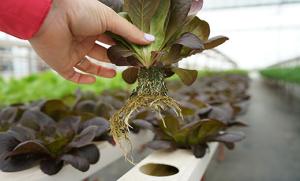
“We had to use modern technologies that lets us control the environment of the plants,” says Karen.
They realized they would need to purify the water to ensure healthy growth, according to Susie, who points to a large reverse osmosis water tank located outside of the greenhouse garden. The tank holds 2,500 gallons of water from the county, which is filtered through the system to be stripped of its nutrients completely, before organic fertilizer, calcium, magnesium, and different vitamins and minerals are added back at the levels that would be best for the plants. The water lands in another 2,500-gallon tank before being run through pipes to reach the plants.
“So, the water quality is the best,” Susie explains, “and compared with drinking water—even better than the bottled water we buy in a supermarket.”
Their hydroponic garden has been a bit of an education for the NRCS as a newer technology, and Purviance is quick to point out that the agency is learning along with the family just how beneficial a system like that can be.
“Ken and Susie came to NRCS about the hydroponic greenhouse from the very beginning as they knew that’s what they wanted to do—that’s the vision they had,” she says, explaining that NRCS doesn’t work with the hydroponic systems and so it was the couple that led that charge.
“It was interesting to see them get this started from the ground up. They’re just very determined people—they go after what they want and they want to see it come to fruition and succeed,” she says.
While NRCS did not assist Ken and Susie with the hydroponic greenhouse, they were instrumental in helping to fund and complete the two seasonal high tunnels. According to Purviance, the couple ordered the materials and kits and then installed them themselves. They also have a contract currently for a third high tunnel 30-feet by 140-feet. “They wanted a bigger one to be able to drive equipment in and be able to do some things more easily than everything by hand,” she says.
Rainwater Catchment to Increase Water Quantity More Efficiently
It’s no surprise to anyone that Texas can get very hot and very dry. Losing any of that water stored in your soil can be detrimental to a farming operation. Denise Farms recognizes this and is now working with NRCS to find a solution to capture that water. That solution is to install gutters and a rainwater catchment system on the large roof surface of the hydroponic greenhouse. The system will include two 6,000-gallon tanks.
NRCS Zone 5 Engineer, Nick Schalitz, is helping the family to plan for the water catchment system. With the agency for six years now, before starting as a zone engineer last November, he was a field engineer who covered this area of Texas and that’s where he started working with Ken and Susie.
“Rainwater harvesting is kind of a newer practice that we do. We do a lot of it, but the standards are still being ironed out. So, I came out to look at that and perform an initial site visit in June 2019 and that’s when I first met them,” he says. “They were very excited to show their water filtration system and hydroponic system to an engineer who would kind of understand it.”
In order to ensure they were using the highest quality water possible, Schalitz says they decided to filter their water using reverse osmosis since a
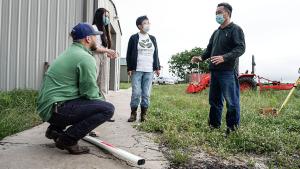
hydroponic garden is so reliant on receiving the nutrients it needs in the absence of soil. According to Schalitz, while planning out the rainwater catchment system, they talked about where they wanted storage tanks, how much storage they wanted, what they wanted to use it for, and whether they had gutters intact.
Schalitz has been impressed with Ken and Susie’s knowledge and drive not only in looking for new ways to improve Denise Farms, but their ability to lead much of the construction themselves. He’s enjoyed sharing ideas and collaborating with the couple and is excited to see how the water catchment system will further enhance their operation.
Stepping Up and Over the Challenge
In achieving their goal to provide fresh vegetables, including distributing those of an Asian variety to meet the demand from that community, Denise Farms has indeed overcome, adapted to, and thrived despite climate issues, a pandemic, water quality, and essentially having to become groundbreakers and experts in an area unfamiliar with hydroponic greenhouses and reverse osmosis systems.
No strangers to taking risks and seeking new technologies to achieve their goals, in addition to taking the time to identify many of the Asian variety vegetables they produce, Susie points out various experimentations they are currently involved in. These include innovative methods ranging from using environment-friendly pest control, to applying volcanic rock to stabilize plants and the nutrients coming from underneath, to choosing to use coconut fiber to transfer seedlings which more easily breaks down and is better for the soil over the less environmental-friendly peat moss.
Absolutely nothing goes to waste on Denise Farms, with plants that haven’t done so well going to feed the ducks and chickens who happily snap them up.
“They are great people to work with,” says Purviance. “Anytime they have questions they come to us, they ask, and we try to get them answers and help them out. Because we want to see them thrive and stay here in the community and be good farmers.”

